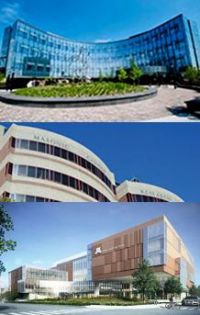Research/nci-role/cancer-centers/find/minnesotamasonic
| Masonic Cancer Center
University of Minnesota Comprehensive Cancer Center Douglas Yee, M.D., Director 420 Delaware Street, S.E. Minneapolis, Minnesota 55455 Cancer Information Line: (612) 624-2620 Patient Appointments: (612) 672-7422 |
The Masonic Cancer Center was founded in 1991 as the University of Minnesota Cancer Center and received its NCI designation in 1998. It was renamed the Masonic Cancer Center (MCC) in 2008. MCC is part of the University of Minnesota’s Academic Health Center, which also includes the Medical School, School of Dentistry, School of Nursing, College of Pharmacy, School of Public Health and College of Veterinary Medicine. The Center’s research partners include the Clinical and Translational Science Institute, Stem Cell Institute, Center for Immunology, and Center for Magnetic Resonance Imaging. The Center’s clinical research and treatment partners include University of Minnesota Health, University of Minnesota Masonic Children’s Hospital, and MCancer Care.
The major research programs of the MCC are: Carcinogenesis and Chemoprevention; Cellular Mechanisms; Genetic Mechanisms; Immunology; Screening, Prevention, Etiology and Cancer Survivorship; and Transplant Biology and Therapy.
Scientific strengths of the 250 MCC research members include: chemoprevention and carcinogenesis, particularly in tobacco; hematopoietic stem cell biology and transplantation, especially in hematologic malignancies; translational research in immune and cell-based therapies; childhood malignancies, including biology, therapy, epidemiology, and survivorship; cancer prevention and screening, especially in colorectal and other solid tumors; immunology; novel mouse models to study cancer etiology and progression; functional magnetic resonance imaging in cancer; and the development of interventional strategies for cancer prevention and treatment.
The Masonic Cancer Center is committed to translating scientific discoveries from bench to bedside by devoting resources to better connect basic programmatic research with the clinic. These resources include a Cancer Experimental Therapeutics Initiative to increase the number of investigator-initiated clinical trials at MCC and the formation of translational working groups that bring together researchers, clinicians, and others in the oncology community to solve problems in organ site- specific cancers. We have also established several mechanisms to increase the involvement of the community, and particularly the underserved populations in our catchment area, in clinical research.
The Cancer and Cardiovascular Research Building, opened in 2013, provides an additional 52,000 square feet of laboratory space utilized by two specific groups of investigators: chemical biologists focusing on studying chemical carcinogens as a cause of cancer, and faculty focusing on novel new therapeutic strategies to fight cancer. A new University of Minnesota Health Clinics and Surgery Center, a state-of-the-art 330,000 square foot facility scheduled for completion in 2016, will bring together the Masonic Cancer Clinic, surgery suites, as well as other specialty outpatient clinics.
The Masonic Cancer Center plays a leadership role in community interactions, outreach, and advocacy. Education and outreach programs in the community include involvement with the Minnesota Cancer Alliance/Cancer Plan Minnesota and the University of Minnesota’s Program in Health Disparities Research.
- This profile was provided by the Masonic Cancer Center.
